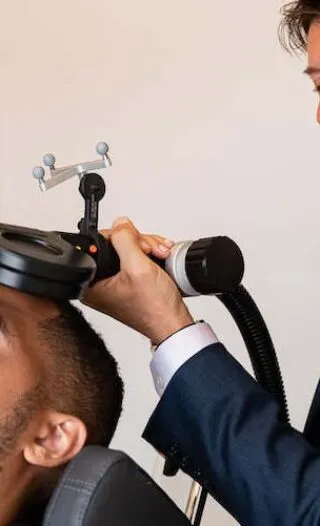A Painless and Non-Invasive Procedure
Transcranial magnetic stimulation therapy (TMS) is an FDA-approved treatment. It uses gentle magnetic pulses passed through the scalp to stimulate specific brain cells. Studies confirm that TMS can enhance mood and behavior in patients with clinical depression, anxiety disorders, addiction, and several other conditions, even those resistant to other treatments. Trying new treatments might make you nervous, but TMS offers a pain-free, non-invasive experience that requires minimal time. Below, you will find details on what to expect from TMS to assist you in making an informed decision about its suitability for you and to prepare you for your treatment session.
TMS does not involve piercing the skin and is a non-invasive therapy. You remain fully conscious throughout the session, allowing constant interaction with the therapist. TMS targets only specific brain regions, ensuring most cognitive and behavioral functions remain unaffected. This means you can comfortably drive to and from the sessions. The therapy involves no pain, and therapists aim to ensure your comfort throughout the session. Most patients report feeling a vibrating or tapping sensation during TMS, and therapists can adjust the machine’s intensity to suit your comfort level.
As TMS activates brain cells linked to movement, you might notice involuntary movements in your hands and feet, like twitching, during the session. This reaction is normal and should not cause concern. If you feel uncomfortable at any point, you are encouraged to communicate with your therapist during the session.
You can engage in various activities during your TMS session, such as reading, talking, watching videos, or meditating. It is often beneficial to focus on positive thoughts and activities during treatment. Your therapist will support you in maintaining a positive outlook, helping you stay calm, relaxed, and comfortable.
After certain TMS sessions, you might immediately notice changes, such as decreased cravings if you are dealing with addiction. Improvements may also occur gradually over time. TMS represents a promising avenue in your mental health journey, and financial constraints shouldn’t be a barrier. Many insurance providers may cover TMS under specific conditions—please reach out to us for a free consultation to explore your options.
Very Few Side Effects
TMS exhibits minimal side effects. The most frequent side effect reported is a mild headache following treatment sessions, which typically subsides after the first week of treatment. This represents a significant advantage of TMS over antidepressants or other pharmacological treatments that may have multiple side effects impacting both body and mind.
At GIA, we provide TMS as a therapeutic option for clinical depression, anxiety disorder, PTSD, OCD, and addiction, specifically targeting alcohol, cocaine, and gambling dependencies. Our team comprises global experts in this field, and we are eager to address any further questions you might have.

